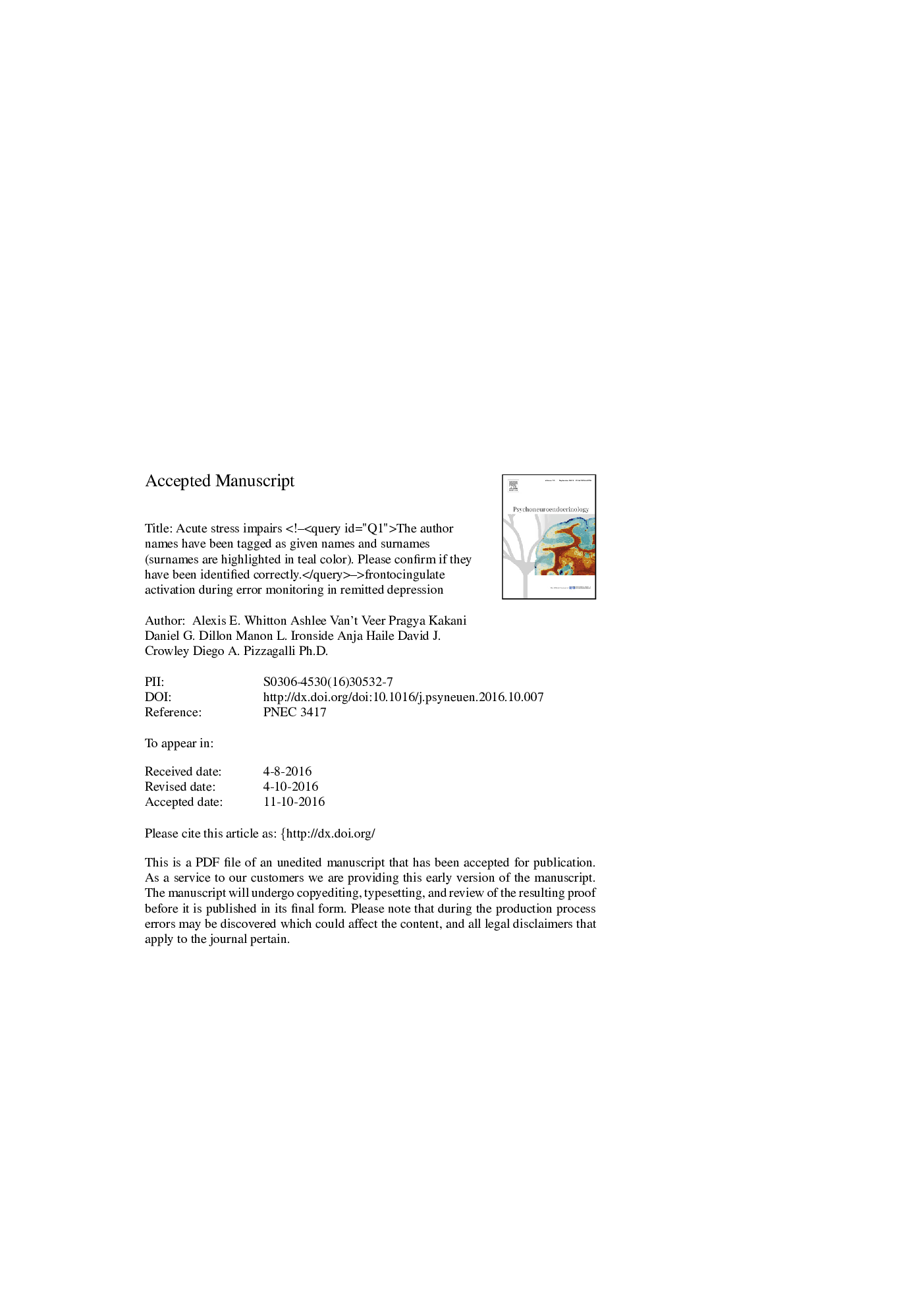| کد مقاله | کد نشریه | سال انتشار | مقاله انگلیسی | نسخه تمام متن |
|---|---|---|---|---|
| 4934617 | 1433968 | 2017 | 34 صفحه PDF | دانلود رایگان |
عنوان انگلیسی مقاله ISI
Acute stress impairs frontocingulate activation during error monitoring in remitted depression
ترجمه فارسی عنوان
استرس حاد، در طول رفع خطاهایی در افسردگی مجدد، فعال شدن جلوی چشم را مختل می کند
دانلود مقاله + سفارش ترجمه
دانلود مقاله ISI انگلیسی
رایگان برای ایرانیان
کلمات کلیدی
موضوعات مرتبط
علوم زیستی و بیوفناوری
بیوشیمی، ژنتیک و زیست شناسی مولکولی
علوم غدد
چکیده انگلیسی
Deficits in cognitive control are a hallmark characteristic of depression, however less is known about the degree to which they persist beyond symptom remission and might contribute to symptom recurrence in remitted individuals (rMDD). Evidence indicates that stress interferes with cognitive control, highlighting a potential mechanism by which stress precipitates depression relapse. Therefore, this study examined whether stress exposure elicits deficits in error monitoring - a component of cognitive control thought to be particularly implicated in the ability to adaptively respond to negative feedback - in individuals with rMDD. Unmedicated individuals with rMDD (n = 30) and healthy controls (n = 34) performed an Eriksen Flanker task before and 45 min after an acute stressor while 128-channel event-related potentials (ERPs) were recorded. Flanker interference effects and post-error adjustments were examined, and ERP analyses focused on the error-related negativity (ERN) and error positivity (Pe). Standardized low resolution electromagnetic tomography (sLORETA) was used to examine stress-induced changes in current source density. Individuals with rMDD showed blunted cortisol reactivity to the stressor, coupled with heightened self-reported stress reactivity. Although no significant effects of group or stress were observed in scalp-level ERPs, source-level analyses indicated that among the rMDD group only, stress caused a reduction in activation in frontocingulate regions critically implicated in error monitoring. The magnitude of stress-induced decreases in frontocingulate activation correlated with heightened self-reported stress reactivity, and also predicted heightened levels of stress and depression 18 months later in the entire sample. These findings suggest that individuals with rMDD show a stress-induced disruption in frontocingulate function that is linked to heightened stress reactivity, and this disruption prospectively predicts heightened levels of future stress and depressive symptomatology.
ناشر
Database: Elsevier - ScienceDirect (ساینس دایرکت)
Journal: Psychoneuroendocrinology - Volume 75, January 2017, Pages 164-172
Journal: Psychoneuroendocrinology - Volume 75, January 2017, Pages 164-172
نویسندگان
Alexis E. Whitton, Ashlee Van't Veer, Pragya Kakani, Daniel G. Dillon, Manon L. Ironside, Anja Haile, David J. Crowley, Diego A. Pizzagalli,
